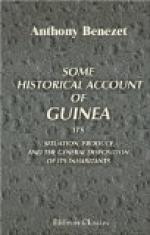To found any right in force, is to frustrate all right, and involve every thing in confusion, violence, and rapine. With these two, the last must fall; since, if the parent cannot justly be made a slave, neither can the child be born in slavery. “The law of nations, says Baron Montesquieu, has doomed prisoners to slavery, to prevent their being slain; the Roman civil law permitted debtors, whom their creditors might treat ill, to sell themselves. And the law of nature requires that children, whom their parents, being slaves, cannot maintain, should be slaves like them. These reasons of the civilians are not just; it is not true that a captive may be slain, unless in a case of absolute necessity; but if he hath been reduced to slavery, it is plain that no such necessity existed, since he was not slain. It is not true that a free man can sell himself, for sale supposes a price; but a slave and his property becomes immediately that of his master; the slave can therefore receive no price, nor the master pay, &c. And if a man cannot sell himself, nor a prisoner of war be reduced to slavery, much less can his child.” Such are the sentiments of this illustrious civilian; his reasonings, which I have been obliged to contract, the reader interested in this subject will do well to consult at large.
Yet even these rights of imposing slavery, questionable, nay, refutable as they are, we have not to authorise the bondage of the Africans. For neither do they consent to be our slaves, nor do we purchase them of their conquerors. The British merchants obtain them from Africa by violence, artifice, and treachery, with a few trinkets to prompt those unfortunate people to enslave one another by force or stratagem. Purchase them indeed they may, under the authority of an act of the British parliament. An act entailing upon the Africans, with whom we are not at war, and over whom a British parliament could not of right assume even a shadow of authority, the dreadful curse of perpetual slavery, upon them and their children for ever. There cannot be in nature, there is not in all history, an instance in which every right of men is more flagrantly violated. The laws of the antients never authorised the making slaves, but of those nations whom they had conquered; yet they were heathens, and we are christians. They were misled by a monstrous religion, divested of humanity, by a horrible and barbarous worship; we are directed by the unerring precepts of the revealed religion we possess, enlightened by its wisdom, and humanized by its benevolence; before them, were gods deformed with passions, and horrible for every cruelty and vice; before us, is that incomparable pattern of meekness, charity, love and justice to mankind, which so transcendently distinguished the Founder of christianity, and his ever amiable doctrines.




